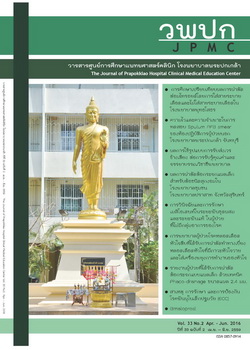สาเหตุ การรักษาและการป้องกันโรคฟันผุในเด็กปฐมวัย (ECC)
Main Article Content
Abstract
โรคฟันผุในเด็กปฐมวัย (early childhood caries, ECC) เป็นโรคฟันผุติดเชื้อที่มีความรุนแรง พบได้ในเด็กทั่วโลก การกระจายของโรคเป็นไปอย่างรวดเร็ว ทำให้เกิดความเจ็บปวดและเสีย ค่าใช้จ่ายสูงในการรักษา ส่วนใหญ่มักพบในกลุ่มเด็กที่มีพื้นฐานมาจากครอบครัวที่มีฐานะทางเศรษฐกิจไม่ดี และยังคงเป็นปัญหาทางทันตสาธารณสุขทั่วโลก สาเหตุหลักเกิดจากปฏิกิริยาร่วมกันระหว่างเชื้อโรค (cariogenic microorganism) คือ mutans streptococci อาหาร (fermentable carbohydrate) และฟัน (host) ทำให้เกิดเป็นไบโอฟิลม์ (biofilms) ที่ก่อโรคฟันผุได้ เป็นกระบวนการที่เกิดขึ้นอย่างต่อเนื่อง จำเป็นต้องได้รับการรักษาทันท่วงที เพื่อลดความเสี่ยงสูงในการเกิด ฟันผุต่อไป บทความฟื้นวิชานี้ได้กล่าวถึงสาเหตุ การรักษา และการป้องกันโรคฟันผุในเด็กปฐมวัย เพื่อให้เด็กมีสุขภาพช่องปากที่ดีและได้รับการรักษาที่เหมาะสม
Causes,Treatment and Prevention of Early Childhood Caries
Early childhood caries (ECC) is one of the most prevalent infectious diseases affecting children worldwide. It is an aggressive form of dental caries, which left untreated, can result in rapid and extensive cavitation in teeth that is painful and costly to treat. Furthermore, it affects mostly children from impoverished background, an thus constitutes a major challenge in public health which remains a significant global problem. The disease is a prime example of the consequences arising from complex, dynamic interactions between microorganisms, host and diet, leading to the establishment of highly pathogenic (cariogenic) biofilms. In this report review to causes, treatment and prevention of ECC for improve childhood oral health and appropriate management

